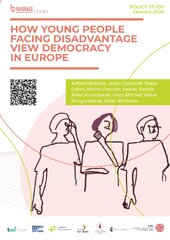How young people facing disadvantage view democracy in Europe
This policy brief provides insight into how young people who experience socioeconomic disadvantage perceive politics and democracy in their country. It explores how this population assesses the benefits, flaws, and ultimately, relevance, of political participation and the policymaking process, and by proxy, the political system itself. It draws on in-depth focus groups with young people in urban and rural areas and interviews with civil society representatives, policymakers, and academics across Ireland, Poland and Spain.
The findings of the research show that young people who have experienced social marginalisation and relative deprivation in all three countries repeatedly claimed that policymakers do not listen to them and respond to their needs. Instead, they contend that, politicians act essentially to preserve their own position
and power. The absence of tangible, positive change in their lives that they can directly attribute to political engagement and policy, has influenced their disengagement and scepticism
about politics.
That said, young people involved in the research supported democracy in principle. Their dissatisfaction was based on lack of trust in elected representatives to affect positive socioeconomic change in their lives and to take action on urgent issues that are important to them, from housing to community development to the climate emergency. Correspondingly, young people value more active, local, deliberative democracy and direct action
